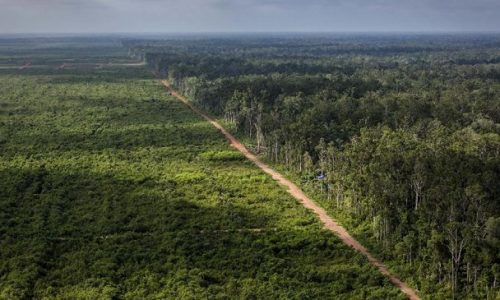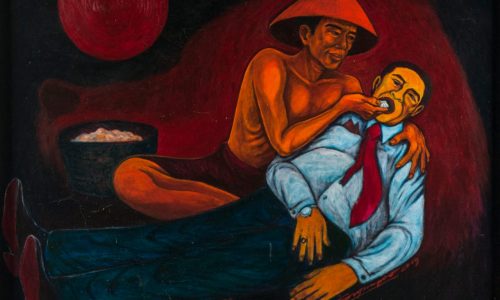Lawyer and petitioners of Indonesia’s new capital believe the Constitutional Court will grant its verdict in favor of the government’s mega project although they deem the law is flawed. The Court will announce on July 20, 2022, its verdict on the judicial review petition against Law No. 3/2022 on new capital city.
Marwan Batubara, representing individual petitioners, said: “We have received the invitation for the verdict.”
The House of Representatives (DPR) passed the law governing the new capital, Nusantara, on January 18, 2022, paving the way for Indonesia, the world’s largest archipelago, to relocate its capital from Jakarta in Java to Nusantara in East Kalimantan.
On February 2, 2022, several intellectuals and activists filed a formal judicial review to the Constitutional Court, claiming that the deliberation of the law was flawed and did not involve public participation.
Lawyer Viktor Santoso Tandiasa, representing the petitioners, believed the Court had no basis for denying or rejecting the petition.
No public participation in deliberating the law
The lawyer said he found several facts before concluding that based on case examination during the hearing, there was no postulate, evidence or explanation from the president and experts from the House that could show that the deliberation process of Law No. 3/2022 on the new capital involved public participation as required by the Constitutional Court ruling No. 91/PUU-XX/2022. Therefore, he said, it was clear that there was no meaningful public participation in the drafting of the said law.
The public failed to secure their rights to have their voice heard, considered and to have their views clarified to them by the parties or groups in society, which will be directly impacted by the deliberation of Law No. 3/2022 or the parties who have concerns regarding the rule-making process.
During the court hearing, relevant parties – including Jakarta governor, Jakarta Regional Legislative Council (DPRD), some elements of Jakarta’s populace, including the petitioners – were not involved in the deliberation.
Indigenous Peoples Alliance of the Archipelago (AMAN) acknowledged that the House had invited them to give their opinions about the proposed law. However, lawmakers did not take their views into account and failed to explain why their ideas were not implemented.
Friends of the Earth Foundation was also not involved in the deliberation, despite being an organization concerned with environmental issues in Indonesia.
In addition, seven tribes in East Kalimantan – namely Dayak Paser tribe, Kutai tribe, Bajau tribe, Dayak Basap tribe, Dayak Kenyah tribe, Dayak Benuaq tribe, and Dayak Tanjung tribe – were excluded in the deliberation of the law.
Limited access to transparency
The deliberation of the new capital law is deemed violating the principle of transparency, according to the petitioners. Based on their evidence, only seven out of 28 stages or schedules of the deliberation have documents and information available to public.
To obtain access to information and documents regarding the deliberation of the law, the petitioners filed a letter of request for documents dated May 9, 2022, to the Ministry of the National Development Planning Agency (Bappenas), the Ministry of Law and the House secretary general.
However, the petitioners did not receive the requested documents until May 18, 2022, which was the end of the hearing session. They said the paper should be readily accessible to follow the principle of transparency.
According to lawyer Tandiasa, his team discovered that the government, as the initiator of the new capital law, only needed three days to correlate the new capital bill and academic script from June 2, 2021 to June 4, 2021. However, on June 3, 2021, the House already issued a letter of completion for the harmonization process.
“I heard from lawmakers that the fastest period to correlate a bill usually takes one month. But this time, it only takes three days,” Tandiasa said.
The Constitutional Court should grant the petition because the witness submitted by the President was unreliable and unworthy of appearing in the court. The witness, former minister of research and higher education Bambang Brodjonegoro, said he was not involved in the legislative process of the new capital law. Considering this, his testimony as a witness was not admissible as evidence, according to the lawyer. Witnesses should be individuals who can observe, hear and understand the law.
Reject or Conditionally Unconstitutional
Despite all the flaws, petitioner Batubara was skeptical that the Constitutional Court would grant his petition to annul the new capital law. He believed the Court would reject their petition instead, or at the very least declare that the law was conditionally unconstitutional, as was the case with the Omnibus Law on Job Creation.
“We are concerned that if the Constitutional Court grants the petition, it will serve like a verdict in favor of the job creation law. The verdict, however, will protect lawmakers, making it easier to implement the law. On the other hand, it is considered conditionally unconstitutional,” said lawyer Tandiasa.
A conditionally unconstitutional law is subject to government and the House’s amendment within a specified period. Despite this, the government continues to implement the job creation law. However, the public will suffer losses since they cannot revisit the law or file another judicial review.
The court will declare a material examination impossible because the norm has been declared conditionally unconstitutional until the formulation and application of the standard by legislators is revised. However, it is essential to note that the government still implements the norms/articles of the law.
“As a lawyer for the job creation law judicial review after the Constitutional Court ruled that it was conditionally unconstitutional, I filed another judicial review of the article that caused the substantial loss. However, the Court denied my petition because they deemed the norms too premature. In reality, the government is still implementing and using the norms,” Tandiasa said.
He expressed concern that the Constitutional Court was “inspired” by its verdict on the job creation law to protect the interests of the new capital development. The Court can declare that the new capital law is conditionally unconstitutional in the government’s advantage. The government can proceed with the construction of the new capital.
Meanwhile, citizens cannot submit a material judicial review since the revision of the law is ongoing, which may result in a change in the norms.
“So, according to the Constitutional Court, they cannot examine the case since the article may be amended in the revision process by the House and the government,” Tandiasa continued.
As a result of such a verdict, the Constitutional Court is attempting to make everyone happy. Accordingly, the petitioner is satisfied with the outcome of their petition, and the government is pleased with the result of their rights being protected. Ultimately, the verdict will not affect the implementation of the norm. Nonetheless, the Constitutional Court is secure due to its ability to accommodate the interests of all parties.
Reasons and Indications
Batubara said there were several indications and reasons to a rejection of the petition or its conditionally unconstitutional. First, the Constitutional Court will rule that the new capital law has been implemented too far, with more than 12 derivatives and regulations in place. In addition, head of the Nusantara Capital City (IKN) Authority has issued several rules. As a result, annulling the law would be counterproductive.
“When we filed the petition, we have requested during the hearing process that the government refrain from issuing regulations and the Constitutional Court suspend implementing rules of the new capital law until the verdict is announced. However, neither party complied to our request. The government continues to issue regulations,” he said.
According to Batubara, rather than issuing derivative regulations, the petitioners believed the government was trying to buy time. In the initial registration process, for example, the Constitutional Court outsmarted the petitioner to slow down the process.
On February 2, 2022, the petitioner filed the petition. Following these, five petitions on other issues were presented by other parties. The Constitutional Court opted to prioritize the five petitions over the petition on the new capital law.
Second, based on the schedule and the regulation, the Constitutional Court should issue the verdict on a formal judicial review within 60 days of the registration. However, the Court delays the process. A government expert will explain the ruling before it is read out.
Third, the Constitutional Court chairman, Anwar Usman, is President Joko Widodo’s brother-in-law. The petitioners’ lawyer warned the Court chairman not to participate in examining the new capital law due potential conflict of interest with his status. However, the Constitutional Court ignored the warning.
Batubara voiced his concern that the Court chairman’s strategic position could be problematic. The Court chairman will automatically have two votes if one of the nine panel of judges is unable to vote.
Four, the petitioner alleged that all nine Constitutional Court judges have received “gratuity” through their positions. During the revision of Law No. 7/2020, the judges secured several facilities. Among the benefits is the extension of the retirement age to 70 years old. A judge may also remain in their office for 15 years.
The House, the government and the Supreme Court each proposed three candidates as the Constitutional Court judges.
“In my view, they wish to give ‘bribes’ or ‘gratuity’ to have the Constitutional Court judges bend down or allow the government to intervene,” said Batubara.
IKN Authority Spokesman Sidik Pramono said the government has delivered its arguments to the Constitutional Court on the deliberation of the new capital law. The government deemed that the process of the law making has been in line with the law and regulations.
“The government will respect whatever ruling issued by the court,” he said.
Bhima Yudhistira Adhinegara, an economist at Center of Economic and Law Studies (CELIOS), said if the Constitutional Court ruled that the new capital law is unconstitutional, investors would withdraw from the project due to the political risk and legal uncertainty.
“Besides that, there are other risks like cost overrun and low IRR [internal rate of return] of the new capital project,” he said.









